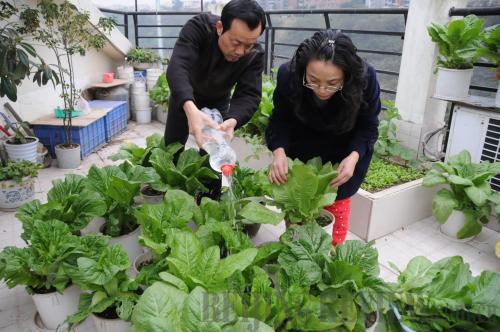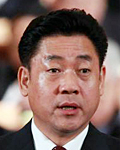|
 |
|
GREEN ROOF: A couple in Nanchong City, Sichuan Province, water vegetables they plant on the roof of their home. It has become a new fashion for urban residents to grow vegetables themselves to eat more naturally and safely (LI XIANGYU) |
 |
|
A TOUGH ISSUE: Liu Peizhi, Deputy Director of the Office of the State Council Food Safety Commission, calls for greater efforts in improving food safety at this year's session of the National Committee of the Chinese People's Political Consultative Conference on March 9 (LIU WEIBING) |
On March 15, the World Consumer Rights Day, China's national TV broadcaster CCTV said in a live televised program Jiyuan Shuanghui, a subsidiary company of China's largest meat producer Shuanghui Group, and several other companies were found to have used pigs fed with toxic clenbuterol for their products.
Shares of Shenzhen-listed Henan Shuanghui Investment and Development Co. Ltd. under Shuanghui Group based in Luohe City, central China's Henan Province, were indefinitely suspended from trading from March 16, after exposure of the scandal.
Clenbuterol is a chemical that can be fed to pigs to prevent them from accumulating fat. It is banned as an additive in pig feed in China because it can end up in the flesh of pigs and is poisonous to humans if ingested. Jiyuan Shuanghui allegedly offered local farmers higher prices for pigs fed with the illegal additive.
This added to the growing list of illegal substances entering Chinese consumers' food chain and raised public concerns about another nationwide health scare similar to the 2008 scandal caused by melamine-contaminated powdered baby formula that killed six babies and sickened nearly 300,000 others.
Root causes
"We are very ashamed of food safety problems," said Wang Qishan, Chinese Vice Premier, at a panel discussion on March 5 with lawmakers from Shandong Province attending this year's session of the 11th National People's Congress (NPC). "We didn't do a good job, and we feel sorry for that."
In 2009, the Food Safety Law was enacted after the milk contamination scandal in 2008. In February 2010, the State Council Food Safety Commission was set up, focusing mainly on issues concerning food additives, edible farm products and food processing.
Wang said despite the government's efforts, food inspection remained weak because of a shortage of staff.
He said during Premier Wen Jiabao's recent visit to Henan, an elderly woman gave Wen some peanuts, telling him to eat with assurance as she grew the peanuts herself.
"It is a common phenomenon now," said Wang. "When I went to suburbs of Beijing, almost all the farmers grow vegetables separately."
Liu Peizhi, Deputy Director of the Office of the State Council Food Safety Commission, told a meeting on March 9 of members of the National Committee of the Chinese People's Political Consultative Conference, the top advisory body, China has 448,000 licensed food producers and 80 percent are small businesses employing 10 or fewer workers.
"Farming and animal breeding are mostly carried out by more than 200 million individual farmers," said Liu. "The problem gave rise to two major food safety hazards: pollution generated by human activities and excessive use of additives."
Liu proposed several measures to improve food safety, including raising the threshold of market access for food companies, boosting government scrutiny over the entire process of food production and marketing and disclosing related information to the public.
Zhu Yicai, an NPC deputy and President of Yurun Group Co. Ltd. in Jiangsu Province, submitted a motion to this year's NPC session on strengthening food safety management in five consecutive years. "I think the law and regulations alone are not enough to deal with food safety problems," said Zhu.
Zhu said industrialization was a must to ensure food safety since many food producers were small and not easy to investigate. "We should have a higher threshold for licensing food-producing companies," said Zhu. "Besides, we should spread food safety knowledge to more people, especially students."
Zhang Xingkai, an NPC deputy and General Engineer of the China Academy of Safety Science and Technology, agreed with Zhu. He said not only the food processing but also agricultural production should be industrialized. He said marketing should also be involved to set up a complete network for food safety.
Law enforcement
Lawmakers and experts have urged for stronger punishment and improved law enforcement to ensure food safety.
| 